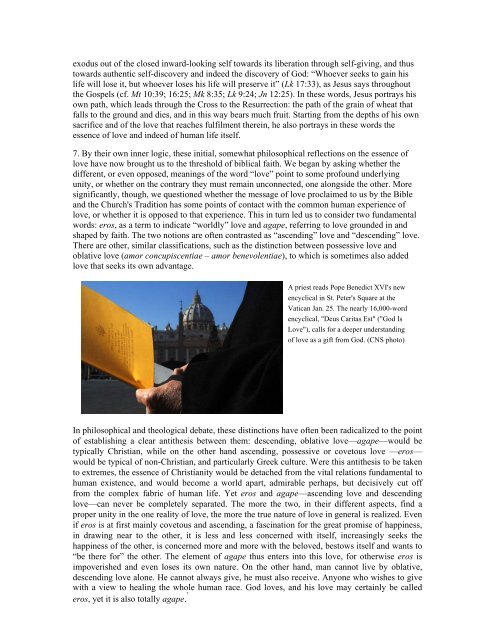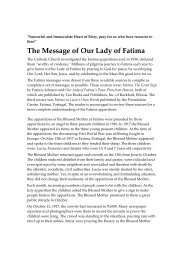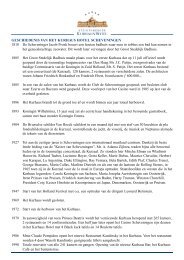exodus out of the closed inward-looking self towards its liberation through self-giving, and thustowards authentic self-discovery and indeed the discovery of <strong>God</strong>: “Whoever seeks to gain hislife will lose it, but whoever loses his life will preserve it” (Lk 17:33), as Jesus says throughoutthe Gospels (cf. Mt 10:39; 16:25; Mk 8:35; Lk 9:24; Jn 12:25). In these words, Jesus portrays hisown path, which leads through the Cross to the Resurrection: the path of the grain of wheat thatfalls to the ground and dies, and in this way bears much fruit. Starting from the depths of his ownsacrifice and of the love that reaches fulfilment therein, he also portrays in these words theessence of love and indeed of human life itself.7. By their own inner logic, these initial, somewhat philosophical reflections on the essence oflove have now brought us to the threshold of biblical faith. We began by asking whether thedifferent, or even opposed, meanings of the word “love” point to some profound underlyingunity, or whether on the contrary they must remain unconnected, one alongside the other. Moresignificantly, though, we questioned whether the message of love proclaimed to us by the Bibleand the Church's Tradition has some points of contact with the common human experience oflove, or whether it is opposed to that experience. This in turn led us to consider two fundamentalwords: eros, as a term to indicate “worldly” love and agape, referring to love grounded in andshaped by faith. The two notions are often contrasted as “ascending” love and “descending” love.There are other, similar classifications, such as the distinction between possessive love andoblative love (amor concupiscentiae – amor benevolentiae), to which is sometimes also addedlove that seeks its own advantage.A priest reads Pope Benedict XVI's newencyclical in St. Peter's Square at theVatican Jan. 25. The nearly 16,000-wordencyclical, "Deus Caritas Est" ("<strong>God</strong> <strong>Is</strong><strong>Love</strong>"), calls for a deeper understandingof love as a gift from <strong>God</strong>. (CNS photo)In philosophical and theological debate, these distinctions have often been radicalized to the pointof establishing a clear antithesis between them: descending, oblative love—agape—would betypically Christian, while on the other hand ascending, possessive or covetous love —eros—would be typical of non-Christian, and particularly Greek culture. Were this antithesis to be takento extremes, the essence of Christianity would be detached from the vital relations fundamental tohuman existence, and would become a world apart, admirable perhaps, but decisively cut offfrom the complex fabric of human life. Yet eros and agape—ascending love and descendinglove—can never be completely separated. The more the two, in their different aspects, find aproper unity in the one reality of love, the more the true nature of love in general is realized. Evenif eros is at first mainly covetous and ascending, a fascination for the great promise of happiness,in drawing near to the other, it is less and less concerned with itself, increasingly seeks thehappiness of the other, is concerned more and more with the beloved, bestows itself and wants to“be there for” the other. The element of agape thus enters into this love, for otherwise eros isimpoverished and even loses its own nature. On the other hand, man cannot live by oblative,descending love alone. He cannot always give, he must also receive. Anyone who wishes to givewith a view to healing the whole human race. <strong>God</strong> loves, and his love may certainly be callederos, yet it is also totally agape. 7
love must also receive love as a gift. Certainly, as the Lord tells us, one can become a source fromwhich rivers of living water flow (cf. Jn 7:37-38). Yet to become such a source, one mustconstantly drink anew from the original source, which is Jesus Christ, from whose pierced heartflows the love of <strong>God</strong> (cf. Jn 19:34).In the account of Jacob's ladder, the Fathers of the Church saw this inseparable connectionbetween ascending and descending love, between eros which seeks <strong>God</strong> and agape which passeson the gift received, symbolized in various ways. In that biblical passage we read how thePatriarch Jacob saw in a dream, above the stone which was his pillow, a ladder reaching up toheaven, on which the angels of <strong>God</strong> were ascending and descending (cf. Gen 28:12; Jn 1:51). Aparticularly striking interpretation of this vision is presented by Pope Gregory the Great in hisPastoral Rule. He tells us that the good pastor must be rooted in contemplation. Only in this waywill he be able to take upon himself the needs of others and make them his own: “per pietatisviscera in se infirmitatem caeterorum transferat”. 4 Saint Gregory speaks in this context of SaintPaul, who was borne aloft to the most exalted mysteries of <strong>God</strong>, and hence, having descendedonce more, he was able to become all things to all men (cf. 2 Cor 12:2-4; 1 Cor 9:22). He alsopoints to the example of Moses, who entered the tabernacle time and again, remaining in dialoguewith <strong>God</strong>, so that when he emerged he could be at the service of his people. “Within [the tent] heis borne aloft through contemplation, while without he is completely engaged in helping thosewho suffer: intus in contemplationem rapitur, foris infirmantium negotiis urgetur.” 58. We have thus come to an initial, albeit still somewhat generic response to the two questionsraised earlier. Fundamentally, “love” is a single reality, but with different dimensions; at differenttimes, one or other dimension may emerge more clearly. Yet when the two dimensions are totallycut off from one another, the result is a caricature or at least an impoverished form of love. Andwe have also seen, synthetically, that biblical faith does not set up a parallel universe, or oneopposed to that primordial human phenomenon which is love, but rather accepts the whole man;it intervenes in his search for love in order to purify it and to reveal new dimensions of it. Thisnewness of biblical faith is shown chiefly in two elements which deserve to be highlighted: theimage of <strong>God</strong> and the image of man.The newness of biblical faith9. First, the world of the Bible presents us with a new image of <strong>God</strong>. In surrounding cultures, theimage of <strong>God</strong> and of the gods ultimately remained unclear and contradictory. In the developmentof biblical faith, however, the content of the prayer fundamental to <strong>Is</strong>rael, the Shema, becameincreasingly clear and unequivocal: “Hear, O <strong>Is</strong>rael, the Lord our <strong>God</strong> is one Lord” (Dt 6:4).There is only one <strong>God</strong>, the Creator of heaven and earth, who is thus the <strong>God</strong> of all. Two facts aresignificant about this statement: all other gods are not <strong>God</strong>, and the universe in which we live hasits source in <strong>God</strong> and was created by him. Certainly, the notion of creation is found elsewhere, yetonly here does it become absolutely clear that it is not one god among many, but the one true <strong>God</strong>himself who is the source of all that exists; the whole world comes into existence by the power ofhis creative Word. Consequently, his creation is dear to him, for it was willed by him and “made”by him. The second important element now emerges: this <strong>God</strong> loves man. The divine power thatAristotle at the height of Greek philosophy sought to grasp through reflection, is indeed for everybeing an object of desire and of love —and as the object of love this divinity moves the world 6 —but in itself it lacks nothing and does not love: it is solely the object of love. The one <strong>God</strong> inwhom <strong>Is</strong>rael believes, on the other hand, loves with a personal love. His love, moreover, is anelective love: among all the nations he chooses <strong>Is</strong>rael and loves her—but he does so precisely












